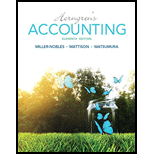
Liabilities:
Liabilities means the present legal obligation of an organization, to transfer or pay future economic benefits in the form of cash, services or goods to another party, which has arisen due to some past events or transactions. Liabilities may be current, long term or contingent in nature. Short term or current liabilities are generally payable in one financial year e.g. sundry creditors, salaries or wages payable, interest payable, unclaimed dividends etc. Long term liabilities are generally payable after a period which is more than a year e.g. long term bank loans, debentures etc.
To determine:
The three main characteristics of liabilities
Want to see the full answer?
Check out a sample textbook solution
Chapter 11 Solutions
Horngren's Accounting (11th Edition)
- Please explain the solution to this general accounting problem with accurate principles.arrow_forwardI am searching for the correct answer to this general accounting problem with proper accounting rules.arrow_forwardi will give unhelpful.blurr image please comment i will write values. please dont Solve with incorrect values otherwise unhelpful.arrow_forward
- Please provide the accurate answer to this general accounting problem using valid techniques.arrow_forwardCompute the total cost of the Graphico order.arrow_forwardCobalt Corporation applies overhead based on direct labor cost. Estimated overhead and direct labor costs for the year were $98,200 and $112,000, respectively. During the year, actual overhead was $94,300, and actual direct labor cost was $108,000. The entry to close the over- or underapplied overhead at year-end, assuming an immaterial amount, would include: A. a debit to Cost of Goods Sold for $300.40 B. a credit to Cost of Goods Sold for $ $394.40 C. a credit to Finished Goods Inventory for 398.80 D. a debit to Work in Process Inventory for 410.00 E. a credit to Factory Overhead for $361.75arrow_forward

 AccountingAccountingISBN:9781337272094Author:WARREN, Carl S., Reeve, James M., Duchac, Jonathan E.Publisher:Cengage Learning,
AccountingAccountingISBN:9781337272094Author:WARREN, Carl S., Reeve, James M., Duchac, Jonathan E.Publisher:Cengage Learning, Accounting Information SystemsAccountingISBN:9781337619202Author:Hall, James A.Publisher:Cengage Learning,
Accounting Information SystemsAccountingISBN:9781337619202Author:Hall, James A.Publisher:Cengage Learning, Horngren's Cost Accounting: A Managerial Emphasis...AccountingISBN:9780134475585Author:Srikant M. Datar, Madhav V. RajanPublisher:PEARSON
Horngren's Cost Accounting: A Managerial Emphasis...AccountingISBN:9780134475585Author:Srikant M. Datar, Madhav V. RajanPublisher:PEARSON Intermediate AccountingAccountingISBN:9781259722660Author:J. David Spiceland, Mark W. Nelson, Wayne M ThomasPublisher:McGraw-Hill Education
Intermediate AccountingAccountingISBN:9781259722660Author:J. David Spiceland, Mark W. Nelson, Wayne M ThomasPublisher:McGraw-Hill Education Financial and Managerial AccountingAccountingISBN:9781259726705Author:John J Wild, Ken W. Shaw, Barbara Chiappetta Fundamental Accounting PrinciplesPublisher:McGraw-Hill Education
Financial and Managerial AccountingAccountingISBN:9781259726705Author:John J Wild, Ken W. Shaw, Barbara Chiappetta Fundamental Accounting PrinciplesPublisher:McGraw-Hill Education





